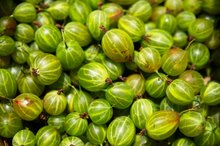Health Benefits of Gardenia Tea
Gardenia, also known by its Chinese name zhi zi, is one of the most frequently used herbs in Chinese medicine 2. It has a bitter taste and a cooling nature. The herb originated in southern China and Japan, and the fruit gum contains the plant's active constituents. The recommended dosage for gardenia is 3 to 12 g daily. Gardenia in its tea form, as opposed to pills or tincture, can be the best way to treat certain disorders. According to Xu Dachun, the 18th-century Chinese physician, "Decoctions (teas) move fast ... their strength quickly subsides." When patients have disorders with quickly changing symptoms, singular herbal teas are appropriate to treat each stage of the illness. Additionally, prescribing teas that require brewing and preparation can emotionally involve the patients in their own healing process, according to "Acupuncture Today." Gardenia has been used for centuries anecdotally, but there is very little scientific research corroborating its effectiveness 1.
If you are experiencing serious medical symptoms, seek emergency treatment immediately.
Alleviate Restlessness and Irritability
Gardenia tea can be used for yin deficiency disorders, which include irritability, restlessness, sensations of tightness in the chest and insomnia. Gardenia is also used in formulas to treat anxiety and insomnia. Menopause can cause these symptoms, and menopausal women can also consume gardenia tea to alleviate related symptoms, such as depression, headaches and dizziness. As with all herbal remedies, a physician should be consulted prior to using gardenia tea to treat health disorders.
- Gardenia tea can be used for yin deficiency disorders, which include irritability, restlessness, sensations of tightness in the chest and insomnia.
- Menopause can cause these symptoms, and menopausal women can also consume gardenia tea to alleviate related symptoms, such as depression, headaches and dizziness.
Urinary Treatment
Lapacho Tea Benefits
Learn More
Gardenia is often used in Chinese herbal formulas to treat bladder infections and painful urinary dysfunction resulting from damp-heat syndrome, which disturbs the function of the bladder, according to the Institute for Traditional Medicine 23. Gardenia has been used for centuries in traditional Chinese medicine, but there is no Western scientific research available that supports the use of gardenia for these health disorders 2.
Warning
Gardenia tea is classified as safe when consumers use it appropriately, according to the American Herbal Products Association, but there are a few caveats consumers should be aware of when using gardenia. Gardenia may lower blood pressure and as a result can contraindicate with anesthetics and blood pressure medications. It should also never be used when the patient has loose stools or loss of appetite. As always, be sure to consult a licensed health care provider before taking gardenia or any other herbal remedy, according to the Encyclopedia of Alternative Medicine, as there is very little Western scientific evidence supporting the use of gardenia to treat health disorders 2.
- Gardenia tea is classified as safe when consumers use it appropriately, according to the American Herbal Products Association, but there are a few caveats consumers should be aware of when using gardenia.
- As always, be sure to consult a licensed health care provider before taking gardenia or any other herbal remedy, according to the Encyclopedia of Alternative Medicine, as there is very little Western scientific evidence supporting the use of gardenia to treat health disorders 2.
Related Articles
References
Writer Bio
Based in Richmond, Va., Tara Carson has written articles for editorial and corporate online and print publications for more than 10 years. She has experience as an adjunct professor of nutrition at Northwest Christian University and holds a Bachelor of Science in journalism and nutrition from Virginia Commonwealth University.








